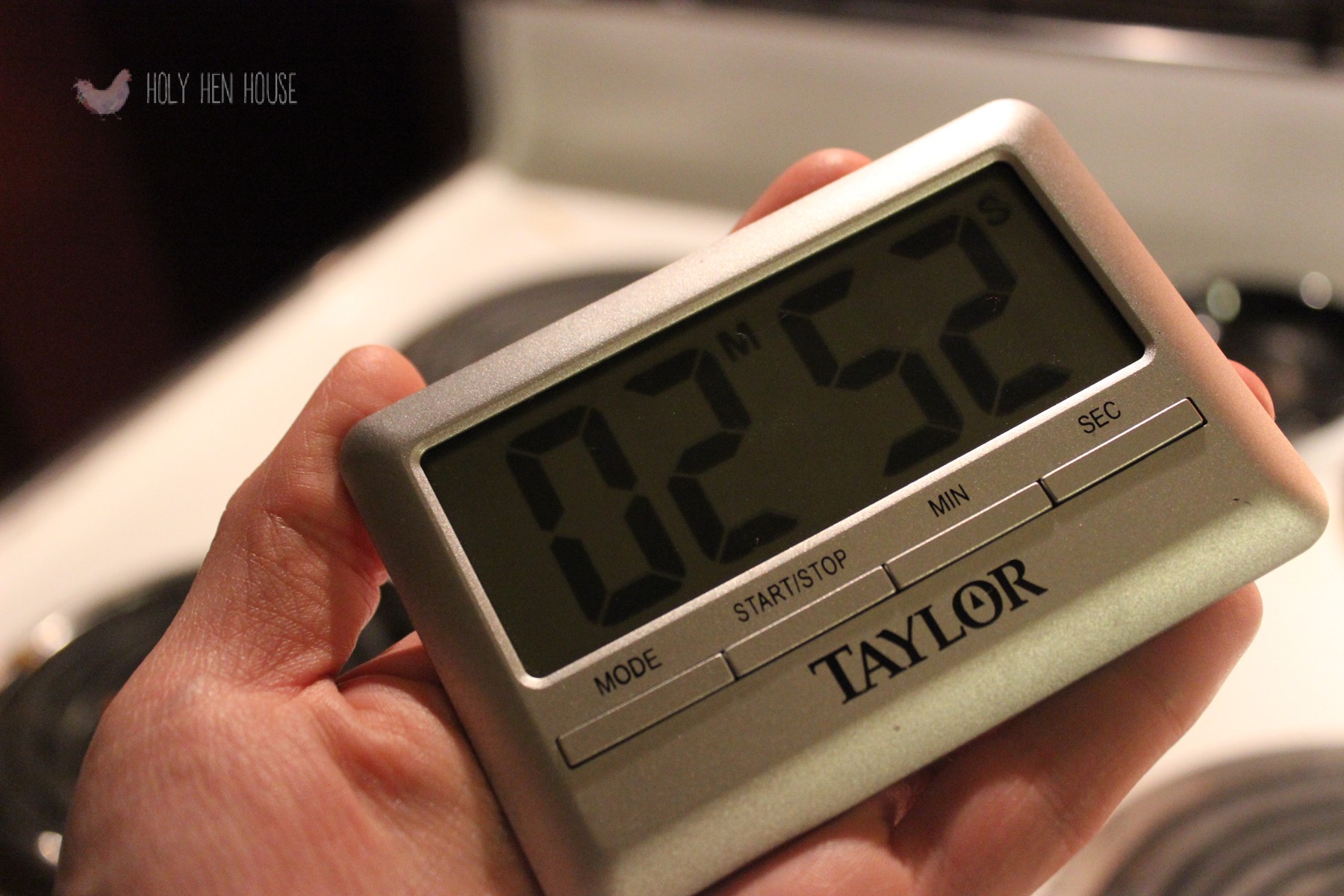When You Just Can't Take a Break
We recently received an email from one of our dear HHH readers. In it, she expressed a concern that’s been heavy on her heart and mind and wondered if we might be addressing the issue at some point in the future. I’d like to share part of her email below (with her permission, of course):
"After dinner or on the weekends, my husband often tells me ‘You need to relax’ or 'Just take a break’. But I know that once I 'stop', whether doing a chore or looking after our toddler, it is painfully difficult to 'start' again. Meaning, I'm tired, plain and simple. My go-go-go activity is my coping method and is often what keeps me upright during the day. If I take a breather, I begin to wallow in self pity about my weariness. How do you ladies find the middle ground between doing too much and feeling overstretched versus giving in to the fatigue and feeling checked out?”
Oh, dear reader. Your quandary is all too familiar for me. I’ve always had somewhat of a “Type A” personality – I like to call it driven. However, there are times when this overwhelming part of my make-up hinges on anxious, maybe even obsessive. My husband might say neurotic. I go-go-go, all day long, never stopping to take a breather, a minute to relax, or even say a prayer for strength to continue making it through the day. It’s not so much a matter of not wanting to sit down, but I know that if I do, it’ll be torture to get back up again. A few weeks ago, our Friday writer, Amber, wrote a three-part post on “Staying Motivated in the Home” which focused on strategies that may help if you find yourself lacking the drive to start projects or plan activities. I -- whether a blessing or a curse -- often find myself with the opposite problem. What if sometimes we "Type A's" are almost too motivated for our own good?
Over the last few years, I’ve become more and more aware of this personality trait as it differs much from my husband’s way of thinking. I often hear similar things from mine as our reader hears from hers: “Does that really have to be done right now?” or “If you’re tired, why don’t you just take a minute to relax?” This began shortly after we were married nearly five years ago and now, throw two toddlers into the mix and it’s only gotten worse. Now that I've become more aware of this "problem", I've began attempting to tackle it from several different angles with the help of various self-help and devotional-type books, advice from friends, and even the wisdom of a professional Christian counselor. I wanted to share a few of the things I’ve learned in hopes that maybe they’ll help some of you who suffer from the same “over-productive” personality put aside the tasks at hand, put on your slippers and take a breather -- without feeling sorry for yourself.
1. Set a time limit. If you’re anything like me, your strong desire to get things done lends itself to an extremely goal-oriented mind set. You like to see things done, reach the “finish line” of a task, if you will. This a great trait, if kept in check. It is important to ask yourself a question: is my goal for this project reasonable? For instance, if you’re working during a two-hour nap time, in hopes of completely a project which may be better executed over more like a half-a-day time frame, you’re going to feel like a failure when your child wakes up and the project is still not complete. Instead of setting a goal to finish a task, try setting a time limit. For instance, I’m going to work on “x” for one hour or until such-and-such a time. If you aren't that disciplined, set an alarm clock or timer to remind you (I have also found it helpful to set it for about 10 minutes before I really want to quit so that I can tie up loose ends...I told you I was a bit Type A). By doing this, you transform your goal in more of a time-focused one, rather than one which is task focused. You will leave your project or chore still feeling as though you’ve accomplished something – and you have! – because you completed your time goal. Perhaps you do have a two-hour window to yourself and you set a goal of one hour for a particular task. This could actually leave you with 60 minutes afterward to “recharge” by reading a book, taking a nap, listening to music, soaking in a bath or anything else that makes you happy before you need to be at the beck and call of your family again.
If you find that you just can’t stop, even with the help of a timer, perhaps try doing it the other way around – set the time limit for your relaxation time and do this first (sounds crazy, I know). This will all you to fit your “recharge” time in prior to launching into your “productive mode” and then you can work for as long as time allows afterward. Whichever way you decide to go about it, strive for balance between both.
2. Evaluate your priorities. It’s so easy to look around your house and see all of the things that “need” to be done: the hamper is over-flowing with dirty laundry, the dust is so thick you can barely see the faces on your Willow tree figurines, you strain to remember the last time you scrubbed the bath tub (one of my least tasks, see my previous post for more), and the kitchen has remnants of each dinner you’ve made (or haven’t made) in the last two weeks. These things just have to get done, right? If the bathroom goes one more day without seeing a sponge…
What? The cleaning police are going to show up at your door and shut you down for neglect?
All too often, I find myself working non-stop to get these things done, thinking that I am surely being the best wife and most excellent mother I can be. The problem is, I also then find myself so utterly exhausted and spent by the time dinner rolls around that I'm no longer good to anyone – completely out of patience and beyond tired, I catch myself snapping at my husband and kids for silly things and lacking the energy needed to even read my girls a story before bed. While yes, performing “wifely” and “motherly” duties are part of my God-given role, did He ever say it was okay to do so at the expense of the things that really mattered? If I convince myself that it is more important to my husband and two nearly three-year olds that they come home or wake up to a clean house and a gourmet meal than having me mentally and physically present in the evening, I am only deceiving myself. It helps me to constantly remind myself about what my family really needs from me most and not just what I think they should need from me. Now, before working at chores and tasks during the entire nap time and then trying to cram in a 3-course meal on top of it, I ask myself: How much energy is this going to leave me at the end of the day? Am I going to be as pleasant when the kids wake up and/or when my husband gets home after all of this as I would be if I perhaps just chose one of these things to accomplish during this period of time?
3. Ask for help to keep yourself accountable. If you’re hearing the line “You need to relax” often from one or two people in particular (as in the case of our reader and myself, it happens to be our husbands), then share your desire to slow down more often with him or her. Explain that accomplishing things and being productive is part of your coping mechanism but that you want to learn how to take time for yourself, too. I’ve found it extremely helpful to tell my husband (on days that he’s home, of course) that I only want to do “x” (i.e. organize my closet, weed the garden, or scrub the kitchen) for a certain amount of time. I’ll ask that he remind me when that time gets nearer and it’s amazing how much harder it is to go against the time limit when he’s the one telling me it's time to quit.
4. Find (or resurrect) a hobby you enjoy. If you don’t have something in particular that you like to do when relaxing, it might feel as if you are simply wasting time or wandering aimlessly if you’re not doing something else productive. I have found that certain hobbies (such as knitting or reading) work well for personalities like mine because I can set goals in them, too. Keeping busy while slowing down (what a paradox!) helps to keep my mind from going down the “woe is me” road and simply focusing on how exhausted I am because of the demands of my life. Or better yet, start finding different ways to reconnect with your spouse – play card games, start doing devotions, or simply talk about the day’s occurrences. What a great way to fill your “down time”!
4. Pray for strength and guidance. I know it sounds cliché, and maybe even a bit too simple, but God truly understands our plight as women. Remember the story of Mary and Martha? Martha was busy with preparations – the Bible goes so far as to call her “distracted” – and her sister, Mary, sat at Jesus’ feet, listening to what he was saying. Martha became so frustrated that Mary did not share her “drive” to prepare that she finally demanded that Jesus tell Mary to help her. This is when the Lord told her that Mary had chosen what was better, the “only one thing” that was needed (Luke 10:38-42). Isn’t it somewhat comforting to know that women have been struggling with this same issue since sin first entered the world?
Also remember that taking time to recharge – physically, mentally, and spiritually – is not selfish. As I mentioned above, doing so can actually be the best thing you can do for your family and those that depend on and love you. Without it, you may find yourself with barely anything left to give. The Bible even sites several occasions when Jesus, in his perfect human state, needed to break away from the crowd that was following him and find rest for himself. For instance, after He feeds the four thousand (a miracle which is not spoken of quite as much as the feeding of the five thousand), the Bible says that he “sent them (the people following him) away” and then “he left them, got back into the boat and crossed to the other side” (Mark 8:13). Even Jesus needed a recharge and this was not selfish – it was necessary.
If you find yourself with thoughts similar to our reader’s, please know that you are not alone. Perhaps you can glean one or two need ideas on ways to approach your situation. If none of them work, then at least you can rest in the comfort that there are other Christian women, just like you, struggling with the same things. Even though it may seem hard to believe, relaxing without falling in to the “pity me” mode actually needs to be learned by some of us. Practicing it will only make it easier as time goes on. And I shall be praying for all of us.




